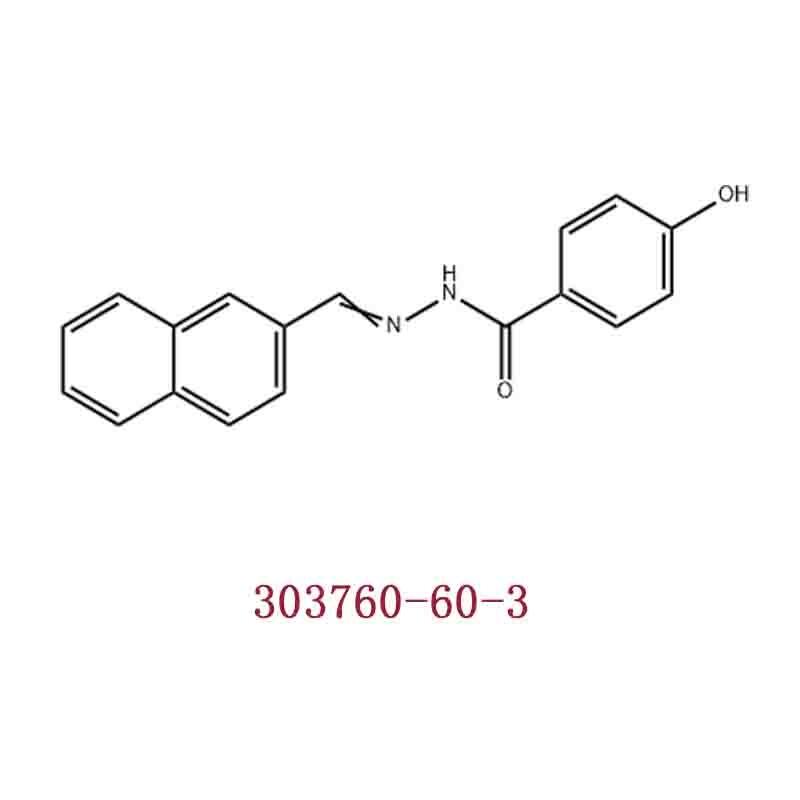-
Categories
-
Pharmaceutical Intermediates
-
Active Pharmaceutical Ingredients
-
Food Additives
- Industrial Coatings
- Agrochemicals
- Dyes and Pigments
- Surfactant
- Flavors and Fragrances
- Chemical Reagents
- Catalyst and Auxiliary
- Natural Products
- Inorganic Chemistry
-
Organic Chemistry
-
Biochemical Engineering
- Analytical Chemistry
-
Cosmetic Ingredient
- Water Treatment Chemical
-
Pharmaceutical Intermediates
Promotion
ECHEMI Mall
Wholesale
Weekly Price
Exhibition
News
-
Trade Service
From April 23 to 24, 2022, the Chinese Society of Clinical Oncology (CSCO) Guidelines Conference was officially held in Beijing
.
At this meeting, 17 new editions of CSCO oncology clinical diagnosis and treatment guidelines, including colorectal cancer diagnosis and treatment guidelines, will be released
.
During the meeting, Prof.
Yuan Ying from the Second Affiliated Hospital of Zhejiang University School of Medicine and Prof.
Chen Gong from Sun Yat-sen University Cancer Prevention and Control Center discussed the "Chinese Society of Clinical Oncology (CSCO) Colorectal Cancer Diagnosis and Treatment Guidelines 2022" for advanced colorectal cancer and early colorectal cancer respectively.
The updated content has been interpreted
.
Edited by Yimaitong as follows
.
Professor Yuan Ying Director, Professor, Chief Physician, Doctoral Supervisor, Department of Medical Oncology, Second Hospital of Zhejiang University, Deputy Director, Key Laboratory of Malignant Cancer Early Warning and Intervention, Ministry of Education Member of the Standing Committee of the Committee "Journal of Practical Oncology" Executive Deputy Editor-in-Chief and Director of the Editorial Department Group Leader Chairman of the Colorectal Tumor Genetics Committee of the Chinese Medical Doctor Association Vice Chairman of the Oncology Branch of Zhejiang Medical Association Vice Chairman of the Precision Medicine Branch of Zhejiang Medical Association Vice Chairman of the Medical Oncology Professional Committee of Zhejiang Anti-Cancer Association Director Professor Chen Gong Physician, doctoral supervisor Deputy Director of Colorectal Department of Sun Yat-sen University Cancer Center Deputy Secretary General Executive Director of Chinese Society of Clinical Oncology (CSCO) Deputy Secretary General of Asian Federation of Clinical Oncology (FACO) 2015-2017 American Society of Clinical Oncology (ASCO) Academic Committee Member, Chairman of the Colorectal Cancer Special Committee of Guangdong Anti-Cancer Association, winner of the 3rd "National Famous Doctor Excellent Demeanor" in 2019, Vice-chairman of the CSCO Colorectal Cancer Special Committee, Secretary-General, Secretary of the CSCO Colorectal Cancer Guidelines Expert Group, and author Member of the Standing Committee of the Colorectal Surgeons Branch of the Chinese Medical Doctor Association Member of the Colorectal Cancer Professional Committee of the Chinese Anti-Cancer Association Vice Chairman of the Liver Metastasis Branch of the Colorectal Cancer Specialized Committee of the Chinese Medical Doctor Association Member of the European Society of Oncology (ESMO) >>>>Update Points Added a note for pembrolizumab in the first-line regimen of the palliative care group: "Based on the results of the KEYNOTE-177 study, pembrolizumab was approved for indications in China in June 2021 and is suitable for monotherapy KRAS, NRAS and BRAF genes are all wild-type unresectable or metastatic high microsatellite instability (MSI-H) or mismatch repair deficient (dMMR) colorectal cancer patients”, indicating that the drug has been approved in China.
Get an indication
.
>>>>Updated Interpretation In 2020, the results of the KEYNOTE-177 study showed that for patients with MSI-H/dMMR metastatic colorectal cancer, the first-line use of pembrolizumab can significantly improve the progression-free survival of patients compared with chemotherapy ( PFS, median PFS 16.
5 months vs.
8.
2 months; HR 0.
60; 95% CI, 0.
45-0.
80; P=0.
0002), the objective response rate (ORR) was 43.
8 in the pembrolizumab and chemotherapy groups, respectively % and 33.
1%, and the rates of grade 3-5 treatment-related adverse events were 22% and 66%, respectively
.
2 Palliative second-line and third-line treatment >>>> Update points The second-line and third-line regimens in the palliative care group are the second-line and third-line regimens for "MSI-H/dMMR, first-line without immune checkpoint inhibitors" The level II recommendation is revised to "immune checkpoints" inhibitors (PD-1/PD-L1 inhibitors)”
.
Based on the existing clinical research data at home and abroad and the 2022 NCCN guidelines, it is recommended that patients with MSI-H/dMMR advanced second-line and above colorectal cancer receive immune checkpoint inhibitor (PD-1/PD-L1) therapy , of which pembrolizumab, nivolumab, and nvolumab have been approved for the treatment of adult patients with unresectable or metastatic MSI-H/dMMR advanced solid tumors, including those who have previously failed standard therapy colorectal cancer patients
.
In addition, Professor Yuan Ying specially explained that after the guideline was compiled, tislelizumab and slulimumab have also been approved for MSI-H colorectal cancer patients, but due to the time of approval, the guideline These 2 drugs are not listed
.
>>>>Updated Interpretation The KEYNOTE-164 study showed that for patients with advanced unresectable colorectal cancer who received ≥2 lines of therapy, after pembrolizumab treatment, the ORR of the patients was 32.
8%, and the 36-month PFS was 29.
0% , 48-month overall survival (OS) was 39.
9%; for patients with advanced unresectable colorectal cancer who received ≥1 line of therapy, after pembrolizumab treatment, the patient ORR was 34.
9%, and the 36-month PFS was 34.
1 %, 48 months OS was 48.
.
The CheckMate-142 study showed that for patients with previously treated metastatic or recurrent colorectal cancer, after receiving nivolumab monotherapy, the ORR was 33%, the 12-month PFS was 44%, and the 12-month OS was 72%; After receiving nivolumab plus ipilimumab, the ORR was 55%, the 12-month PFS was 71%, and the 12-month OS was 85%
.
The CN006 study showed that for patients with advanced colorectal cancer who received ≥1 line of therapy, the ORR was 43.
1%, the disease control rate (DCR) was 61.
5%, and the 12-month PFS was 43.
7% after receiving nvolimumab.
The 12-month OS was 72.
9%
.
3.
Summary of updated guidelines for advanced colorectal cancer For patients with MSI-H/dMMR metastatic colorectal cancer, the highest level of first-line palliative treatment is recommended as pembrolizumab, an indication approved in China
.
For patients with MSI-H/dMMR metastatic colorectal cancer, the second-line and third-line palliative treatment is recommended as an immune checkpoint inhibitor (PD-1/PD-L1 inhibitor), and pembrolizumab with indications is preferred.
anti-, nivolumab, and nvolumab, and the recently approved tislelizumab and slulimumab
.
In addition, Professor Yuan Ying explained the hotspot strategies not recommended in this version of the guideline, mainly including: • For patients with advanced MSI-H/dMMR, the dual-immunity combination therapy is still in the exploratory stage and needs to wait for the verification of phase III randomized clinical trials , the guidelines do not recommend this strategy
.
• For late-stage microsatellite stable (MSS)/normal mismatch repair gene (pMMR) patients, the guidelines do not recommend the use of immune checkpoint inhibitors, including the "REGONIVO model" of immunotherapy + anti-vascular therapy
.
• For the first-line treatment of patients with advanced MSS/pMMR, the guidelines do not recommend "immune plus" strategies such as chemotherapy + antivascular therapy + immunotherapy
.
Early-stage colorectal cancer 1 Diagnosis of colon cancer/rectal cancer >>>> Update points "Staging diagnosis (diagnosed by colonoscopy)" revised, the level I recommendation is revised to "chest plain scan or enhanced CT and abdominal/pelvic enhanced CT" >>>>Updated Interpretation The preoperative diagnosis of colorectal cancer should be standardized, and enhanced CT of the chest, abdomen and pelvis is the standard initial examination for staging diagnosis
.
Considering that at the initial diagnosis, patients usually do not have lung metastases, the recommendation for a chest scan was added
.
2 Postoperative adjuvant chemotherapy for colon cancer >>>> Update points 1 For patients with "stage II low-risk (T3N0M0, dMMR)", the description of "T3N0M0, dMMR whether or not accompanied by high-risk factors" is added
.
>>>>Update Interpretation The 1st edition of the CSCO colorectal cancer guideline clarifies the weight of T4, a high-risk factor for pathology, and dMMR, a low-risk factor for molecular typing, that is, the weight of dMMR is less than that of high-risk pathological factors of T4.
Therefore, stage II dMMR Colorectal cancer patients, if T4, are classified as high-risk patients; otherwise, they are low-risk patients
.
>>>>Update Point 2 In Note a, the "poor tissue differentiation (grade 3/4, excluding MSI-H)" among the high-risk factors for stage II is uniformly expressed as "poor tissue differentiation (high grade, excluding MSI)" -H)", which is unified with the pathological diagnosis section of the guideline
.
>>>>Updated Interpretation 2 The classification method and the degree of differentiation are related in text, and the corresponding relationship between the "high-grade" histological classification and the "low-differentiation" histological type is clarified
.
>>>>Update Point 3 Revised "high-risk stage II (except T4)" in note g to "high-risk stage II", and considered that all high-risk stage II patients could consider the 3-month CAPEOX regimen (capecitabine + oxaliplatin) adjuvant chemotherapy
.
>>>>Updated Interpretation The final OS results of the 3IDEA study showed that there was no significant difference in OS between 3-month CAPEOX and 6-month CAPEOX for both high-risk and low-risk stage II/III colorectal cancer patients , only for high-risk patients, 6-month FOLFOX (5-FU + leucovorin + oxaliplatin) was significantly better than 3-month FOLFOX regimen
.
3 Follow-up of colorectal cancer >>>> Update points to add note f/g: Recent studies have shown that dynamic ctDNA monitoring can help early warning of postoperative recurrence and metastasis, but should it be routinely used for postoperative follow-up and guide treatment Controversy remains
.
>>>>Updated interpretation of minimal residual disease/molecular residual disease (MRD) is one of the important evidences for judging the residual level of cancer cells.
Some studies suggest that ctDNA dynamic monitoring can indicate tumor recurrence earlier than imaging 5.
01 months
.
Therefore, Professor Chen Gong believes that MRD has become a new standard for evaluating whether the tumor is "cleared", and may become an important means of predicting tumor recurrence in the future
.
However, there are still many clinical controversies in the field of MRD.
Therefore, the new version of the CSCO diagnosis and treatment guidelines first mentions the ctDNA detection method, and retains a cautious attitude
.
4 The early-stage colorectal cancer guidelines update the diagnostic chapter of small nodule colon cancer/rectal cancer: "Staging diagnosis (for those diagnosed by colonoscopy)" Level I recommendation is revised to "chest plain scan or enhanced CT and abdominal/pelvic enhanced CT"
.
The chapter on postoperative adjuvant chemotherapy for colon cancer: • For "stage II low-risk (T3N0M0, dMMR)" patients, add a description of "T3N0M0, dMMR with or without high-risk factors"
.
• In Note a, "poor tissue differentiation (grade 3/4, excluding MSI-H)" among high-risk factors for stage II is uniformly expressed as "poor tissue differentiation (high grade, excluding MSI-H)", It is unified with the pathological diagnosis section of the guideline
.
• Revised "high-risk stage II (except T4)" in note g to "high-risk stage II", considering that all high-risk stage II patients can consider 3-month adjuvant CAPEOX regimen (capecitabine + oxaliplatin) chemotherapy
.
Follow-up chapter of colon/rectal cancer: Added note f/g, "Recent studies have shown that dynamic ctDNA monitoring can help early warning of postoperative recurrence and metastasis, but whether it should be routinely used for postoperative follow-up and guide treatment still exists Controversy
.
"Editor: Youshi Reviewer: Uni Typesetting: Youshi Execution: Youshi Famous Teacher Classroom, scan the code to enter ▼▼▼







